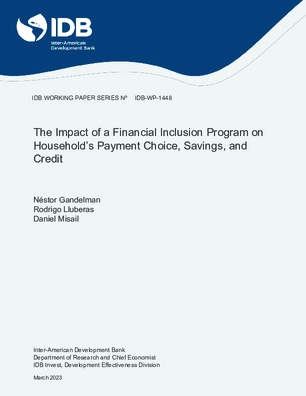The Impact of a Financial Inclusion Program on Household’s Payment Choice, Savings, and Credit
Date issued
Mar 2023
Subject
Labor Force;
Saving;
Credit Card;
Value-Added Tax;
Wage;
Public Expenditure;
Banking Function;
Financial Inclusion
JEL code
D12 - Consumer Economics: Empirical Analysis;
G21 - Banks • Depository Institutions • Micro Finance Institutions • Mortgages;
G50 - General
Category
Working Papers
Uruguay implemented an ambitious financial inclusion program that included a fiscal stimulus through VAT rebates and subsidies for point of sale (POS) adoption. One of its main provisions banned cash payment of wages and social benefits and forced financial institutions to open wage-accounts with extremely beneficial conditions. In the aggregate, the number of debit cards transactions increased sharply. We test the wage-banking channel of the financial program exploiting differences in the treatment intensity between public sector and private sector workers. We find that while the provision of bank accounts increased the number of debit cards, it had modest effects on the probability of payment with cards that are mostly produced by a more intensive use of debit cards by those who already had them before the Financial Inclusion Act went into effect. Thus, the aggregate effects must be produced by the fiscal channel of the financial inclusion program. Finally, we fail to find effects on either access to short-term credit or expenditure or savings.
Generative AI enabled




